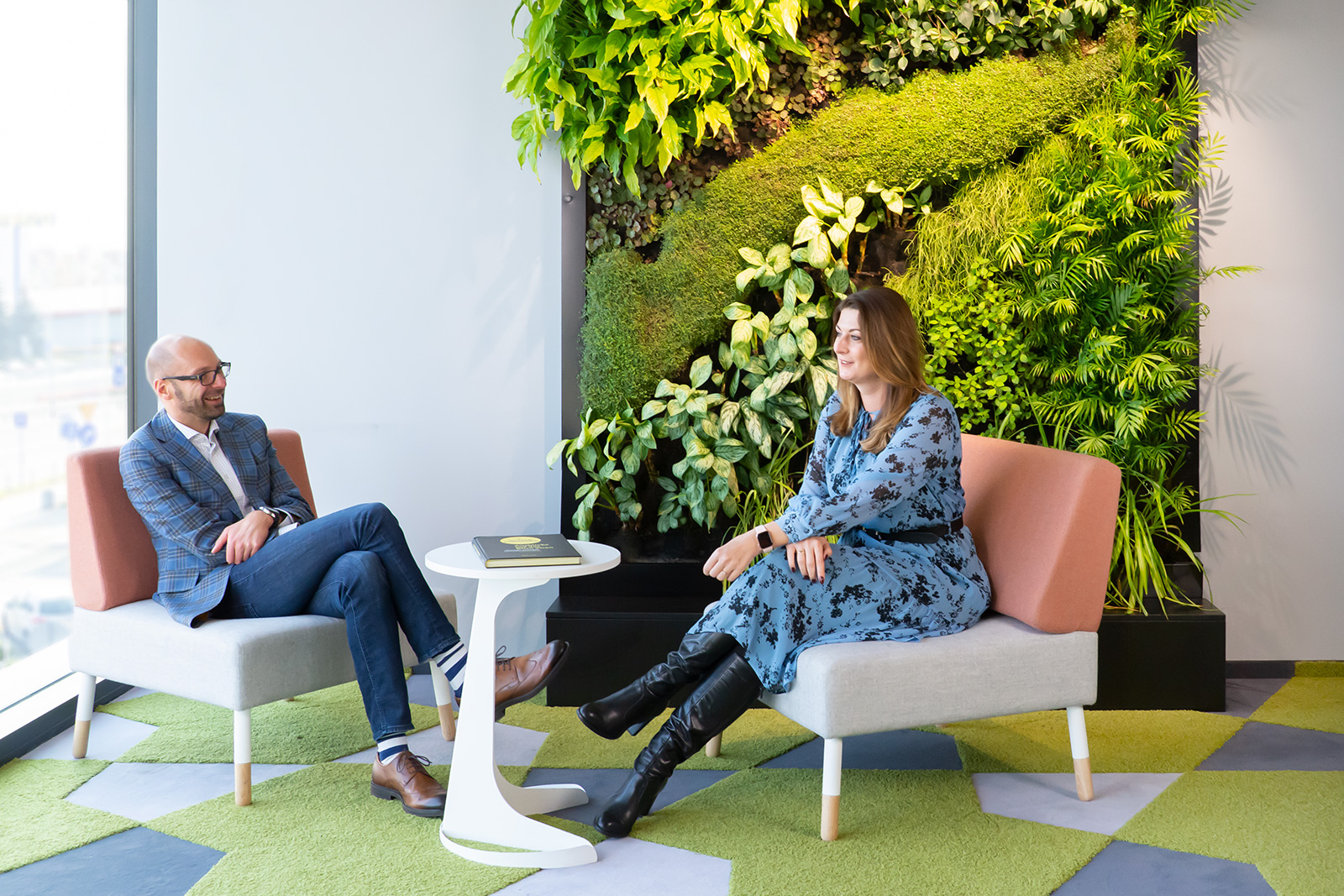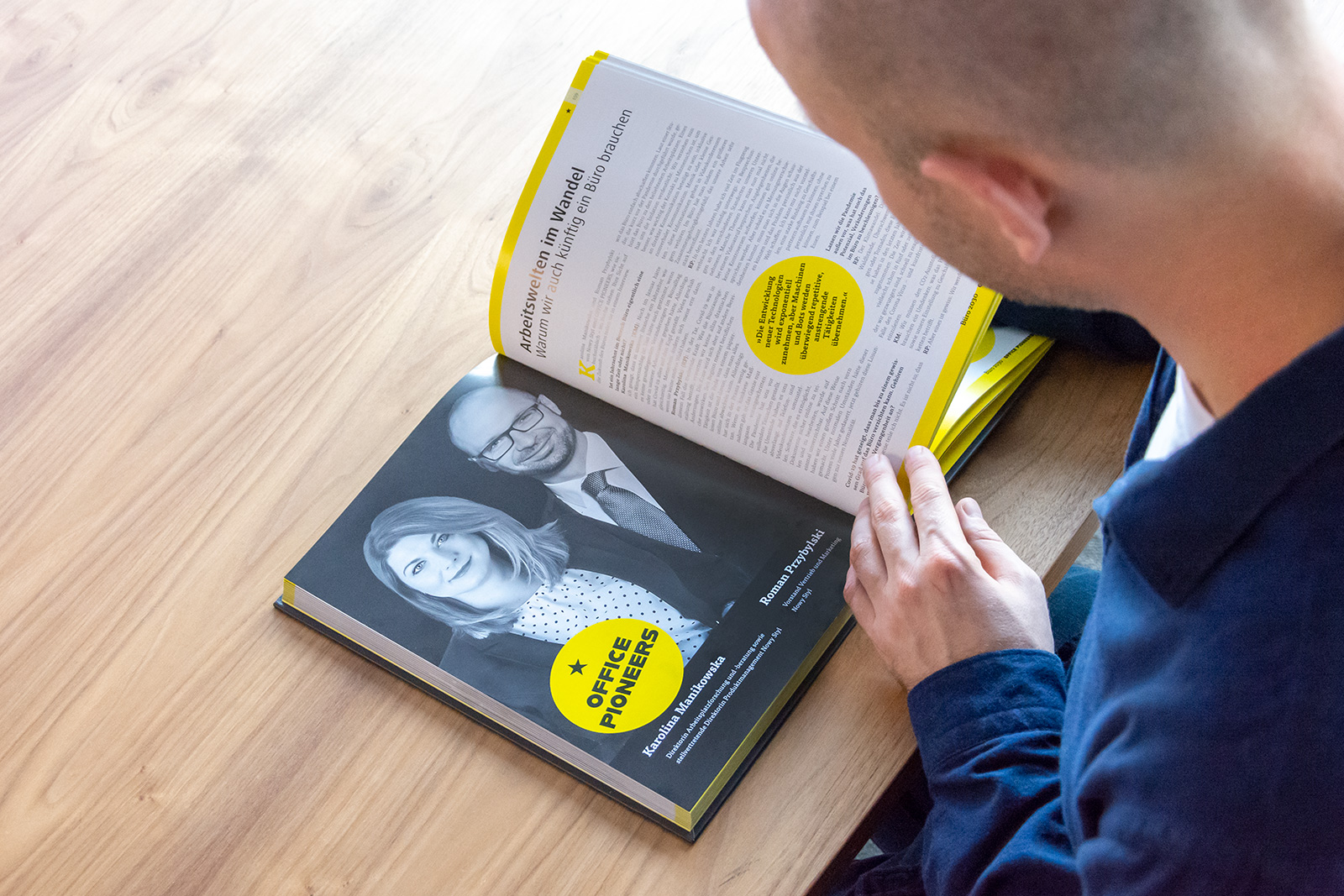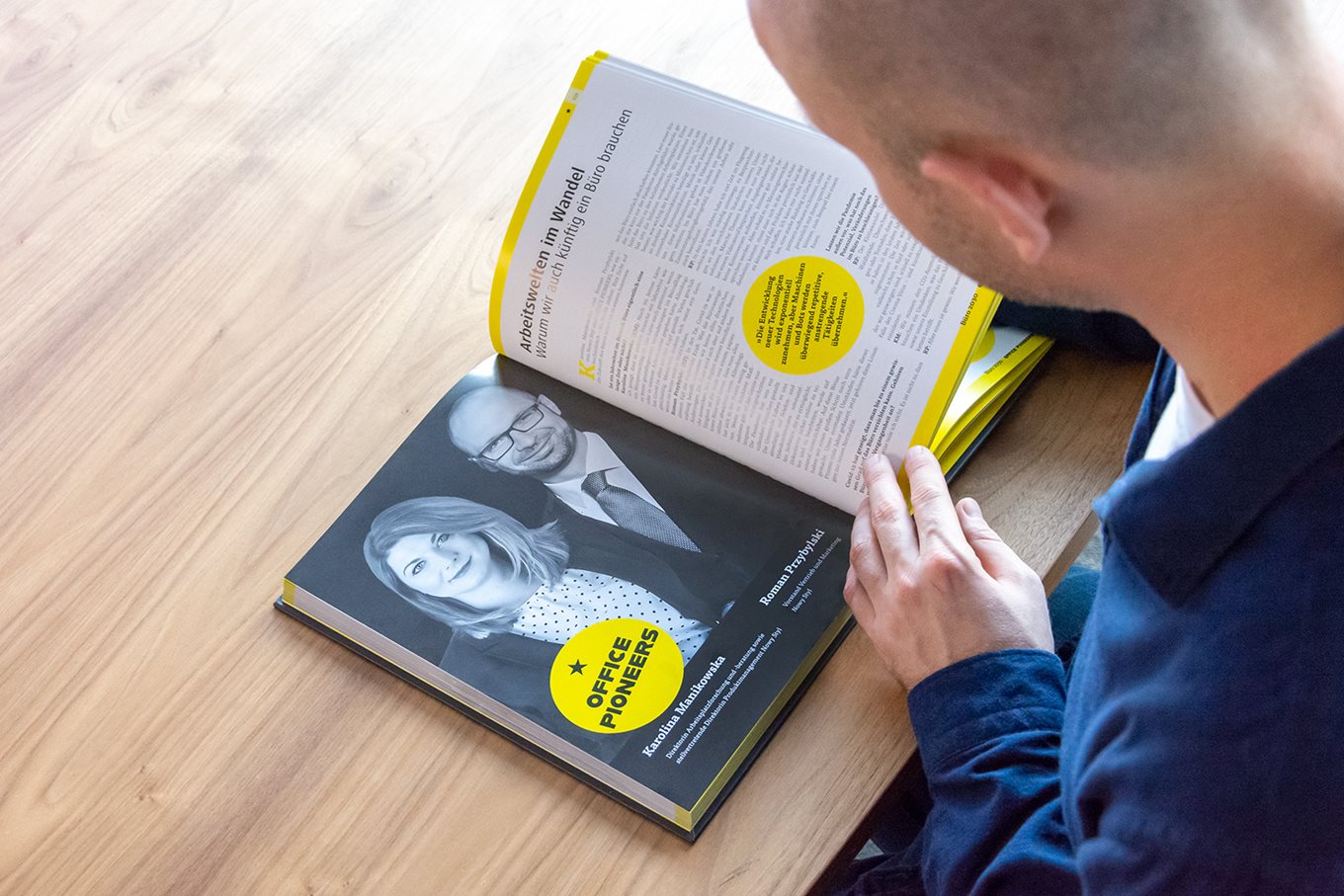A nap in a capsule? Nowy Styl in a book about office pioneers
People will always need an office and an office will always need people, which is why offices will survive any crisis – Karolina Manikowska and Roman Przybylski share this idea in an interview published in a book titled Office Pioneers. Vision of the office in 2030. Read more to learn what experts from Nowy Styl think of the changes triggered by the pandemic, climate crisis and speedy automation.
Offices will survive any crisis
People need an office, an office needs people
Looking ahead – to 2030. Is 10 years a lot or not?
Karolina Manikowska: - Back in January I would have told you that a decade, at least in our industry, is not much, even if you consider rapid development of the latest technologies. It would have been true, assuming there are no revolutionary changes in the offices or, generally speaking, in the approach to work. However, COVID-19 has turned it all upside down. Many things happened all at once, because people are likely to change when they have no choice.
Roman Przybylski: - Exactly, COVID-19 is the key aspect here. As far as the layout of the offices is concerned, we may expect no serious changes, but the crisis is going to affect other areas. Since I started working, a lot has been said about paperless office and going online with multiple processes, but not much was actually done about it in practice. And even if there was any progress, it was rather slow. The pandemic presented us with a fait accompli. And quite suddenly, too. We all turned to conference calls, virtual meetings, video calls and tools for sharing documents. We had no choice; we had to get used to and become familiar with all these technologies. This is how we made a big step forward. Under normal circumstances it would have taken ages. Now, these solutions are here to stay. They will be retained and treated as an insurance policy, in case something similar happens again in the future. And it will happen again, it’s just that we don’t know when.

COVID also proved that you can do without an office, to a certain extent. Maybe offices will become a thing of the past?
K.M.: - I don’t agree with this point of view. It’s not that you can eliminate offices altogether. According to the study conducted before the pandemic, an office was selected as the favourite place to work. Isolation made it all the more clear to us. We saw how important it is to be in touch with other human beings, to be able to exchange opinions, to be involved in direct communication, including non-verbal language. Facial expressions, breathing, position of hands or minor gestures – all this is lost even in a video call. In the office you have a greater sense of belonging, which directly impacts our involvement in the work we do.
R. P.: - For the past few years I can say I’ve been living on a plane. I was constantly on the move: to numerous meetings in our branches and companies. This was because there are certain things you cannot discuss during a video call. Of course, all the obvious topics, which do not raise any controversies, can be addressed online, but whenever a personal conflict or a difference of opinions appears, then you have to sit face to face and explain the problem. I can’t imagine I could build strong relations with business partners if I could did not the opportunity to talk to them directly, in private, e.g. at dinner.
Epidemic aside, what else could impact faster changes in the office?
R. P.: - Climate change. Drought, forest fires, floods or tornadoes – all of these have been on the increase over the past years. There will be a time, maybe in 5 or 10 years, when situation will force us to react quickly – just like coronavirus did – and we will have to take rapid measures.
K. M.: - For example, we will have to reduce CO2 emissions. The way we travel to work will have to change, as well as our approach to business trips and supply chain. We will be planning all of these bearing in mind the need to minimise the carbon footprint.
R. P.: - But one thing is for sure: we will always need offices. After any crisis, no matter how serious, we will do our best to go back to normal as soon as possible.
Why is it so?
K. M.: - As regards the social aspect, the possibility to be in touch with other human beings is the key. Sometimes it’s even simple moments that matter: a brief conversation in the corridor or while you wait in front of the coffee machine. As regards the professional aspect, people tend to inspire one another. We learn from each other, which boosts our development.

Assuming that robots and bots were to replace human beings, is it possible we could learn something from them?
R.P.: - Personally, I’m a fan of good science-fiction, but when I consider the scenario of people being replaced by machines and programmes, I’m optimistic. Development of technology will increase exponentially, but machines and bots will be used mainly where work used to be a nuisance anyway. I mean repetitive, arduous tasks, such as computing rows of numbers or rewriting lines of a code. Our domain will be creativity, problem solving skills or scientific research. In these areas I’d say there’s no risk of humans being replaced by machines. Not in 2030, not even in 2050 or 2100.
K.M.: - One example comes to my mind in this respect: purchasing processes. As we can see, basic activities are already performed by computer programmes. They apply dummy variables as filtering criteria or sum up certain data and present the outcome. Still, it takes a human being to evaluate the outcome of such work and consider certain unmeasurable criteria, which can affect the ultimate results. Programmes are devoid of empathy – the ability to feel or experience emotions. Empathy is a human trait. We can rest assured that wherever empathy is called for, no machine will replace us.
Ok, some more futurology, then: do you expect any changes in our working position? This would be quite a revolution for your industry. Maybe in 10 years we will be working in a lying position?
K. M.: - This is no futurology. There have been multiple attempts at this idea. People used to come up with products that were supposed to mark a new era in the history of ergonomics, but so far none of these ideas has caught on. And I think there will be no such revolution in the nearest future.
R: P.: - We will observe revolutionary changes in the way we collaborate with one another. The function of the office is about to change. It will become a primary place of human interaction, a source of mutual inspiration and a way of finding solutions. Of course, technology is going to develop, as mentioned before, but biological evolution of human beings is not going to keep up with the pace of these developments. That’s why even in a hundred years’ time we will be working in a sitting position, making occasional breaks to move around, just to remain healthy and fit. Maybe the proportion of the time we will spend sitting down will change, but chairs and desks will continue to rule as the basic office equipment.
Are we going to replace office furniture with new models, or will we opt for reusing and renovating old equipment?
R. P.: - Circular economy is already an important aspect of many tenders, for example in the Netherlands, where you need to include renovation of old furniture as part of your bid. This trend will definitely expand to other countries and the share of “reused” furniture will increase consequently. Still, the production is not going to stop altogether, because no piece of furniture lasts forever. There is a limit to the repairs and reworking jobs you can perform.
K. M.: - And there’s another thing – an office is also a service. One of the directions our brand is following is a holistic outlook on the office: a client pays a fixed fee to rent an office and the price includes a complex range of services. Basic equipment is provided, as well as ongoing maintenance, repairs and necessary rearrangements, stock-taking and waste disposal. Circular economy would, of course, be yet another element of this service. We need to bear in mind, though, that in some countries these changes are going to be slower, because possessing new items is seen as a status symbol.

Let’s talk about demography for a while. Societies are getting older. How will it impact the shape of offices?
K. M.: - On the one hand, we will have more and more older people working in the offices, but on the other hand, younger generations are much more aware of the need to keep fit – they realise the importance of healthy food, exercise, work-life balance and wellbeing. All of this will help create a healthier work environment. There are also attempts to introduce a shorter working week, for example 4 days at the office. Studies are conducted to test the impact it would have on our effectiveness. The results of such tests seem promising, so I wouldn’t be surprised if we were to work less in 10 years’ time.
R. P.: - You’ve mentioned keeping fit. We often skip one important aspect: sleep.
What about sleep? At work?
R. P.:- Actually, I was thinking about a nap. Research shows that a brief nap during the day may positively affect long and healthy sleep at night. If we’re looking for new ways to boost our effectiveness, this is the thing to consider, even in offices. I don’t know when and I’m not sure how – whether it will be a couch in the office or a zone with isolated capsules - but I’m convinced that sleep will be increasingly important in the work environment.
Assuming we will go for capsules – will a zone like this be considered a perk? Something companies use to lure the best specialists?
R. P.: - Yes, I believe so, especially until napping becomes more popular in offices. And it will take some time, mind you. It may be more than 10 years from now.
K. M.: - And some of this time will be needed to change the mindset of employers. We had a similar situation with zones or spaces that are now rather popular, for example focus rooms, chill-out rooms or spacious kitchens. It took some time for people to realise the importance of such areas. I can imagine that will take a while before employers decide to allow naps at work and gain sufficient trust in their employees to believe they are not abusing this option and that they really need it. But while we’re talking about perks, let’s go back to COVID-19 once again. I believe there was something positive about the pandemic, namely it curbed the most unrealistic expectations among employees.
R. P.: - You mean something like slides, climbing walls or something?
K. M.: - Or models of cars. Both employees and employers became more realistic, which helped them clean the office space by removing such absurd elements.

I guess offices were cleaned in more than one way, so to say.
K. M.: - Definitely. They became cleaner and more hygienic. There are now more antibacterial solutions such as special finish or sanitising products. I believe these solutions will stay with us, because now we are aware of what could be if we do not follow certain rules. We will be much mire cautious in the future. Besides, such products make us feel safe at work. Minimalistic interior design and light, subdued colours have the same effect.
R. P.: - It’s good you mentioned minimalism. It is expressed in the intuitive design of products. Although we are talking about the future of office space, which makes us think of complex, advanced technology, but I think less is more when it comes to office design. It’s good to make things easier, simple. That’s why we go for reliable furniture and devices, which are easy to learn and to use. This is how I understand good, skilful design. Fancy inventions are misleading – we’ve seen it on many occasions.
K. M.: - Too many functions – this is one of the mistakes manufacturers make when designing furniture and equipment. Multi-purpose products are created, but most of their functions are never used. And sometimes people try as they might to come up with something distinctive, unique. In my opinion, the world of design should rather go for a few basic products which can be easily customised. A good example is a smartphone for which you can choose a casing in a colour that you like or buy a fancy pocket to hold it. A similar mistake, but observed in architecture, is when you allow designers – very famous ones or, conversely, those who want to make a name for themselves – to let their imagination run wild. In a book titled The Age of Spectacle. Adventures in Architecture and the 21st-Century City Tom Dyckoff aptly dubbed this phenomenon as ‘starchitecture’, which means designing with the sole object of going down in history. Unfortunately, it is often the case that stunning effect does not come with proper functionality.
What is the recipe for a functional office, then?
R. P.: - The design and arrangement should be the outcome of actual collaboration of several specialists: some of them make sure the building is aesthetic and up to its role, while others analyse how a specific company works and try to organise the office space and choose relevant equipment so as to guarantee effective and healthy work environment. This would be a perfect combination. This is what I would like to see in 2030 instead of science fiction solutions.
The interview was published in a book entitled "OFFICE PIONEERS: Ausblicke auf das Büro 2030" edited by Robert Nehring, published in Berlin in 2020.
